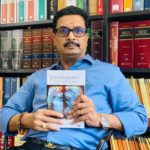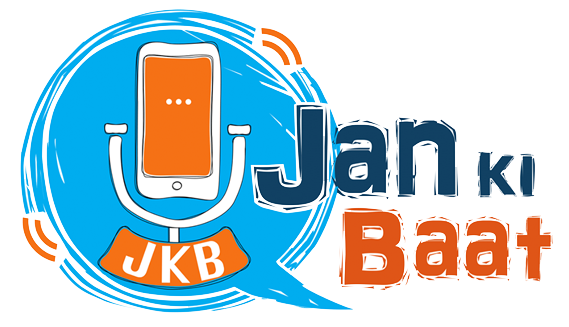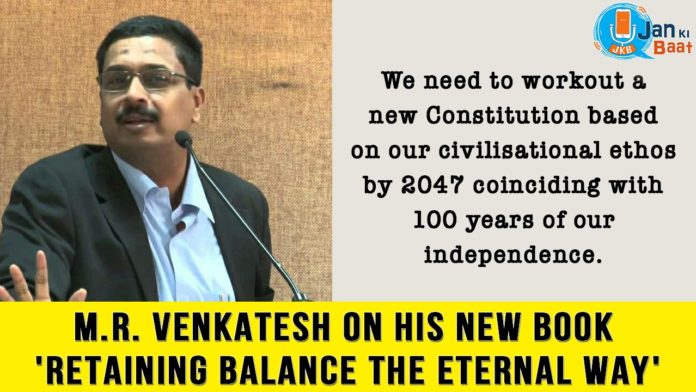One of the most well known voices in India Mr. M.R Venkatesh speaks about his new book ‘Retaining Balance The Eternal Way’ to Jan Ki Baat’s Debarghya Banerjee in an email Interview & emphasizes about the importance of family welfare in economics & why the rights & duties of an individual matter more in today’s socio-economic perspective

Ques) What was the important message that you wanted to impart through your book ‘ Retaining Balance The Eternal Way? Is this a study on the macroeconomic understanding of India?
Ans) The answer to this question is an emphatic YES but with a civilisational dimension! Put pithily, my book in quintessence, relates to the discipline of economics, more particularly to macroeconomics from a theological, cultural and civilisational standpoint. In the process, it seeks to figure out various linkages to the economic performance of an individual, society, and the nation; more particularly through culture, theology and civilisation.
Ques) In the beginning of the book, you’ve wrote how this book seeks to look into the imbalances & attempts at providing appropriate prescriptions? What are the ‘imbalances ‘ according to you & do you think economists deliberately missed the ‘family, culture & civilizational’ aspect of economics?
Ans) There are several imbalances in the modern society. These get reflected in our economic policy formulations. The fundamental one is between a man and woman at a personal level, as much as it is between Rights and Duties of individuals at a social level as it is between equality and liberty at the constitutional level. I have also dealt with quite a few other imbalances – that is, we have a paradigm where one complimentary element is in effect, mostly because of our faulty policies, paradoxically in conflict with the other. And I am of the firm opinion that the family, rooted in culture and civilisation, is a balancer between several conflicting forces. And economists have been missing this crucial point.
Ques) Do you think by ignoring the ‘family, culture, civilisation’ aspect of economics, there’s been a fatal blow to the economics in India?
Ans) I would unhesitatingly say yes. But the issue is not limited to economics. Remember the Constitution of India also does not talk about family. In fact, our constitution is a Christian Construct based on their idea of ‘Broken-Self.’ And we believe in a divine self. And that gives arise to a fundamental conflict between an Indian who believes in Constitutional Rights and a Bharatiya who believes in duties of Self.

Ques) How is your book different from other books on economies, considering there’s a huge number of books written & studies based on this subject?
Ans) I have not treated Economics as a discipline – but as a way of life – reflecting our culture and civilisational values. Thus, any excess committed by us in our life should instantaneously get reflected in the performance of the national economy. Let me elaborate. For instance, there are some societies even to this day that believe in Polygamy, which in my view is an excess. To put it in modern lingo, when one alpha male takes 4 females, then 3 males are left without any females. That means they are the victims of the excess committed by one Alpha male. And consequently, they have to either attack other societies to get a female partner. If they succeed, they set other societies on the boil. And if they fail, they would not get any partner in this world. Hence, they should visit the other world for their promised tryst with 72 virgins! This disturbs the peace and by extension progress of mankind.
Do we realise how Polygamy practiced in distant land can affect peace in your land and thereby affect your economic performance? Unless that Alpha male is tamed in that distant land it can have an effect on the economic performance in our land.
Let us not forget that the taming of the Alpha male in our history and establishment of the institution of monogamous marriage is emblematic of the onset of civilisation; a point in time in our history where the Homo Sapiens was converted into Man.
Ques) Do you think this book is a contradiction to the Western philosophy of economics?
Ans) Yes, absolutely! While we believe that the taming and neutralising the Alpha male is the first building block to progress, the West too recognises the fact about the pitfalls of an Alpha male but goes about to create an Alpha female to deal with the Alpha Male. Thus, the West believes that the excess of an Alpha Male will be counterbalanced by the excess of the Alpha female. We do not believe in either Alpha Male or Alpha female! We believe in the fusion of male and the female – exemplified by Ardhanareshwara. The West even to this day believes the female to be inferior to male – a fact that is lost on many.
Ques) Why do you say ‘ Marriage is the mother of all institutions ‘ in your book & how do you relate it within the economical periphery?
Ans) A brilliant question and goes to the root of the book. Family is a bulwark against all ‘isms’. It stands protecting the individual against the corrosive state and an extortionist market. Thus, family is common enemy of both Marxists and free market liberals. And in the destruction of the family, there is a strange alliance of both Marx and free markets champion. Contrary to the belief that it is the individual who takes economic decision, one can make it bold to say that it is the family that takes several decisions pertaining the individual – including what he purchases, uses, produces, how he saves and where he invests. Yet economists ignore family and seek to deal with the individual (as opposed to family) – who without the protective ring of the family would instantly become easy pickings.
Ques) How would you describe the allusion to Ram Rajya in the book & Do you think it implies the ideals of good governance?
Ans) The conflict between Western philosophy of rights and our emphasis on duties runs throughout the book. That the ‘Fundamental Rights’ enshrined in our Constitution needs to be counterbalanced by Fundamental Duties, which is missed by most Western philosophers and even by the framers of the Indian Constitution but repeatedly emphasised by the Mahatma. And let us not forget that Ram Rajya was a call of an independence movement. And let me hasten to add that Ram Rajya is an eternal idea – absolutely secular and completely delinked from anything theological – where individual duties override everything else. Needless to emphasise the ideals of good governance is rooted to adherence to individual duties than demanding enforcement of individual rights!

Ques) How would like to analyse the economy in today’s time considering the ravaging covid wave & it’s after effects on every particular sector? How’d you rate Modi government’s handling of the economy post covid?
Ans) We are an extremely stressed-out economy because of several reasons. The promised green shoots since 2016 have not been flowering. Several issues plague our economy at a structural level. One of them being excessive reliance on the Government, resulting in a corrosive tax regime and spawning of reckless welfare measures. Unless we reassess the role of the State, duty of the citizen and the umbilical cord that links these two Viz., taxation, we will only be incremental. This is why we are unable to take quantum leap in our development cycle. Modi government is doing its best. But it is getting stuck because of a reluctant babudom and a dysfunctional judicial system.

Ques) Lastly what would be the message to our readers?
Ans) To buy Retaining Balance – Read it, understand it, discuss it and if possible, even debate and critique it! Importantly, we need to work out a new Constitution based on our civilisational ethos by 2047 coinciding with our 100 years of our independence.

